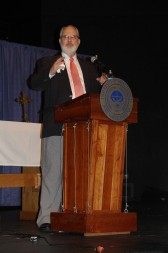September 28, 2016 // Local
White Mass, conference uplift Catholic medical community
By Jodi Marlin

Dr. Thomas Hilgers, founder and director of the Pope John Paul II Institute for the Study of Human Reproduction, delivers the personal, emotional history that led to the institute’s establishment in 1985. On Sept. 24 in Fort Wayne, Hilgers headlined MedCon, a day of education for Catholic medical professionals that put faith-based care in the limelight.
In a world where inconvenient children — whether by virtue of undesirable genes, or the timing of their conception — are considered unworthy of life, the work of the Pope John Paul VI Institute presents a contrary opinion. In addition to supporting parents’ decision to carry to term children identified as carriers of Down Syndrome, the institute, founded on the research and passion of French geneticist and physician Dr. Jerome Lejeune, exists to offer Catholically informed alternatives to medical practices that treat women’s fertility as a disease, often risking that fertility.
The history of the institute and its inspiration, along with other pertinent topics for medical professionals of the Catholic faith, were heard by over a hundred participants at MedCon, a one-day conference organized by the Dr. Jerome Lejeune Catholic Medical Guild of Northeast Indiana. The conference was held in conjunction with the annual White Mass celebrated by Bishop Kevin C. Rhoades specifically on behalf of those who practice medicine. Both took place at the University of Saint Francis, Fort Wayne, on Saturday, Sept. 24.
Providing the day’s keynote address was Dr. Thomas Hilgers, founder and director of the Pope Paul VI Institute for the Study of Human Reproduction in Omaha, Neb., and developer of the Creighton Model Fertility Care System. Hilgers and the institute are renown for their work on reproductive and women’s health issues, including the innovative fertility procedure known as Natural Procreative Technology.
Hilgers led his address by noting the impact Lejeune made on the practice of medicine. Lejeune is credited with discovery of the chromosomal abnormality that results in Down Syndrome, a breakthrough that the doctor who possessed a fondness and compassion for children affected by the abnormality, was proud of.
The world put his X chromosome test to a purpose abhorrent to the faithful Catholic, however. Since then, Hilgers said, “Down Syndrome children have been the target of search and destroy missions all over the world.”
The Pope Paul VI Institute exists to counteract that practice and to engage in other life-affirming research. The Creighton Model Fertility Care System, a form of natural family planning, was developed by Hilgers and is gaining practitioners; Natural Procreative Technology, known as NaPro, is an institute-developed method of monitoring women’s overall reproductive health and treating reproductive disorders. Both are approaches to fertility and women’s health used by physicians worldwide, including within the Diocese of Fort Wayne-South Bend. The medical professionals of the institute itself have directly treated patients in every state in the U.S. and on six continents.
“It showed that if you announce yourself as Catholic, and you’re in the area of reproductive medicine, they will come. They will truly come,” Hilgers told his fellow physicians in attendance.
Rounding out the instructional portion of the day were discussions led by Sister Mary Diana Dreger and Dr. Ashley Fernandes on “What is Conscience?”; by Fort Wayne OB/Gyn Dr. Chris Stroud and Hilgers on difficult issues in women’s health; Fernandes and Dr. David Kaminskas about end-of-life and assisted suicide considerations; and other topics surrounding the intersection of faith and medicine.
Theresa Schortgen, a Creighton Model specialist working in the Fort Wayne area, appreciated the conference’s patient-centric message.
“Sister Mary Diana’s and Dr. Fernandes’ talk oriented health care providers toward providing care that is just to the person — in this case, the women,” she said. “If and HCP gets off course, the recipient does not receive comprehensive care in line with their presenting needs.”
The day’s Eucharistic culmination included an observation by Bishop Rhoades that during this Year of Mercy, Pope Francis hoped to see a revival of the corporal and spiritual Works of Mercy.
“For you who serve in the medical profession, there is a special link to various works of mercy. I think especially of the corporal work of visiting the sick. You visit the sick to tend to their illnesses and to help them heal. I think also of the spiritual work of comforting the afflicted. The comfort you provide your patients is an important element of their healing and of their overall wellbeing,” he said.
In the day’s Gospel reading, the parable of Lazarus follows the life both Lazarus and a rich man from this life into the next — a journey that lands the rich man in a starkly painted description of hell. Because hell is real, Bishop pointed out, the question of mercy, and how we use it here on earth, is a serious one.
“We must be careful. We do believe and affirm that the mercy of God is infinite, but this should not lead to the sin of presumption, to thinking that because God is so loving and merciful, it doesn’t matter what we do in this life, that somehow God will save us. This is the position of those who do not believe in hell,” he said. “Some think of God’s mercy as a right that we have. No, it is a gift. It is gratuitous. We can accept or reject it. We are rejecting it when we do not show love and mercy to our neighbor.
“We can think of it this way: mercy has three dimensions, not just one dimension, not just me; and not just two dimensions, me and God. Mercy always travels in three dimensions: God, me, and the other. We must be merciful to others if we hope to receive the gift of God’s mercy.”
The best news. Delivered to your inbox.
Subscribe to our mailing list today.





